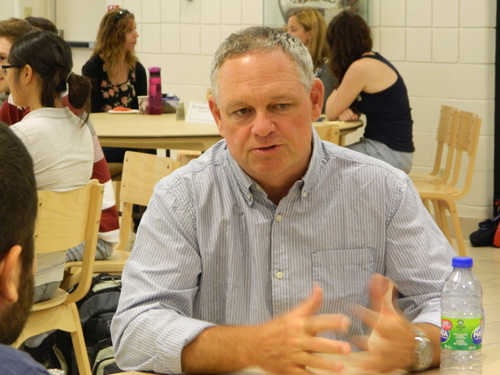
Working on a research project over the summer is invariably an educational experience: you learn far more than just the content of your project. For students participating in the Summer Leadership and Research Program (SLRP) offered by the Ontario Veterinary College (OVC), what they learned in the lab or in the field was enhanced by a series of opportunities to develop new skills and talk to experts in less traditional areas of work.
“SLRP provides undergraduate and DVM students with opportunities to interact with scientists and veterinarians working in different areas,” says Prof. Gordon Kirby, associate dean, research and innovation. “Students have face-to-face meetings with professionals who can provide advice on career planning and decision-making. The students get to go on field trips to sites such as the Toronto Humane Society, the Toronto Zoo and the hospitals in Hamilton. They also participate in local conferences.”
The program has been offered for 10 years and is overseen by a committee of OVC faculty and co-ordinated by student affairs manager Elizabeth Lowenger. It starts in the second week of May with an orientation for all participating students. Lowenger says about half are science students hoping to attend OVC; the rest are current DVM students.
Three weeks in, the students are asked to do a short presentation for the entire group about the research work they are engaged in. That could be intimidating enough, but to help the students learn to think on their feet and be prepared to defend their work, many faculty members also attend and ask questions. Sometimes, hard questions.
For example, student Mary Thompson spoke about her research on American opossums in southern Ontario. Since opossums are known to carry diseases in the United States, and because they have expanded their territory into Canada, researchers want to know what potential illnesses they may be bringing.
In Thompson’s study, the opossums were captured and tested for several diseases, then released. She was asked: “How do you deal with the possibility that you’re just catching the same opossum over and over?” Her response explained that those captured are ear-tagged to eliminate that problem.
A major element of the summer program is encouraging awareness of potential career paths, so a few weeks later the students were all invited to enjoy lunch in the OVC cafeteria and play what Lowenger jokingly calls “career speed dating.” Ten guests were invited to host tables, and students spent 15 minutes with each before moving to the next table.
At one table, Amanda MacFarlane discussed her work with Canada’s Outdoor Shows. She graduated from U of G’s biological resource management degree program in 2012, specializing in equine studies. Now she works on organizing outdoor trade shows such as Canada’s Outdoor Equine Expo and Canada’s Outdoor Farm Show.
“The best part for me is when the show opens, and we can see everything we worked on all year actually happening,” she told the group.
At another career “date,” David Leger, DVM ’83 and M.Sc. ’10, gave students a brief synopsis of his career. “After graduating as a DVM, my first practice was all dairy cows,” he said. “Many of the farms I went to see at that time are now under asphalt.” He later joined a mixed practice but, after hurting his back, decided to change careers and returned to graduate school at age 43 to study epidemiology. While still in school, he was hired by the Public Health Agency of Canada. “I have the responsibility to talk to animal producers about the issues we see,” he explained.
Kelsie Jagt, who graduated in June from biology and genetics, plans to start a master’s degree in public health. She has participated in SLRP twice and said a highlight this year was the field trip to Hamilton where the group visited several hospital laboratories. The tour was hosted by Ron Carter, DVM ’83 and PhD ’88, who is director of laboratory genetics services at McMaster Medical Centre and an OVC classmate of Kirby.
Judy Keys, who received a PhD in animal science from U of G in 2007, took students to the research lab at Hamilton General Hospital to see their clinical trial facilities, which can run trials using up to 200,000 tissue samples. Keys is biobank and quality administrator at the Clinical Research and Clinical Trials Laboratory.
Jagt’s response: “We were able to see how they do things in their labs; it’s a lot different than a research lab. For one thing, their turn-around time needs to be really quick, because people are waiting for those results to determine medical treatments.
“There’s an immediate impact on people’s lives,” said Jagt. “It was really cool to see what I’ve learned in class put into action.”
Jagt also praised the experience she gained doing oral and poster presentations. When their summer research projects wrapped up, the students put together a poster presentation about their results and presented these to the group. This requirement helps students prepare for making similar presentations at conferences in the future.
“Getting to do a presentation and have people question you on it opened my eyes to the need to really know your stuff in these situations,” Jagt said.
Kirby adds: “We see this as a way to give students experiences and connections to be better prepared to make decisions about their careers and know more about all the options available to them.”